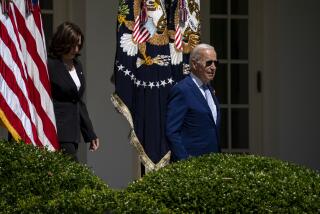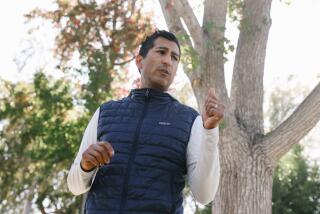House to Weigh Curbs on Gun Shows, Flea Markets
- Share via
WASHINGTON — The House debate today on firearm laws, like the one that consumed the Senate a month ago, will pivot on how much the federal government should regulate gun sales at flea markets and gun shows.
For all the political rhetoric that has been expended by both sides, at first glance there is little to separate three competing proposals that claim to close the “gun show loophole.”
One measure, favored by gun control advocates, would allow as many as three business days to screen the criminal records of would-be purchasers at gun shows. Another, billed as a compromise, would allow three calendar days for the background checks. And a third, favored by the National Rifle Assn., would allow 24 hours.
Even Sen. Frank R. Lautenberg (D-N.J.), chief sponsor of a gun show measure that passed the Senate last month by a whisker over the objections of the NRA, acknowledged Wednesday that few people outside the Beltway grasp the importance of such distinctions.
“These are arcane points, and we have to continue to clarify them,” said Lautenberg at a news conference.
Gun shows have become a focus of increasing concern since 1993, when Congress first mandated background checks for gun sales processed by federally licensed dealers.
The reason? At the typical gun show, at least a quarter and often many more of the gun vendors are unlicensed. Such vendors are not bound by the background check requirement. A study by the departments of Justice and Treasury in January reported that there are more than 4,400 gun shows across America each year. Law enforcement agents say that, at many of these shows and at countless other flea markets and informal bazaars, criminals are obtaining guns without the hindrance of background checks.
Gun control advocates are lining up behind a proposal by Rep. Carolyn McCarthy (D-N.Y.), whose husband was killed and son was seriously injured in 1993 by a rampaging gunman. McCarthy is the lead sponsor of a measure that is almost identical to what passed in the Senate on May 20. It would require background checks on all firearm transactions at gun shows and maintain the stipulation in the 1993 law that checks may take up to three business days.
Advocates say that only a fraction of checks would take that long but that law enforcement agents frequently need to search court records to prevent illegal purchases by felons and fugitives. Courts are not open on weekends or holidays, when most gun shows take place. McCarthy’s proposal identifies gun shows, in general, as any public event with at least two gun vendors and at which 50 or more firearms are for sale.
But many gun rights advocates prefer a measure offered by Rep. John D. Dingell (D-Mich.), the senior Democrat in the House. His effort is backed by the NRA and such Republicans as Majority Whip Tom DeLay of Texas. It would leave only 24 hours for gun show background checks on the premise that to delay potential sales any longer could hurt the business of the shows. It would also “clarify” the definition of a firearm transaction. Critics say that fewer gun sales would be subject to checks as a result.
Another proposal panned by both sides has been offered by Reps. Henry J. Hyde (R-Ill.) and Bill McCollum (R-Fla.). It calls for background checks to be completed within three calendar days, which is not quick enough for Dingell and not long enough for McCarthy. But Dingell, unlike McCarthy, agrees with most of the Hyde-McCollum measure. Gun control advocates criticize it for narrowing the definition of a gun show to exempt events with fewer than 10 vendors and reducing paperwork potentially useful to law enforcement.
More to Read
Get the L.A. Times Politics newsletter
Deeply reported insights into legislation, politics and policy from Sacramento, Washington and beyond. In your inbox twice per week.
You may occasionally receive promotional content from the Los Angeles Times.










